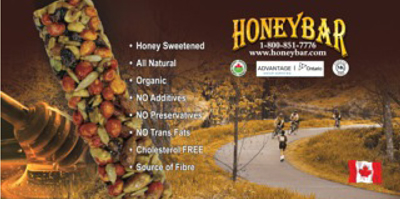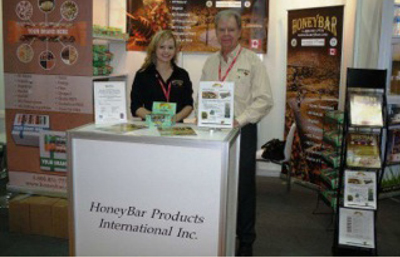
bh IN BRIEF
Export Development Canada (EDC) is a Crown corporation that helps Canadian companies respond to international business opportunities by providing financing, insurance and bonding services, as well as trade and market expertise.
To read about more success stories and get more information, visit:
www.edc.ca.
|
|
Every day, small, medium and large Canadian enterprises compete with the world’s best – making a difference in every industry. Many have been helped by Export Development Canada (EDC). Here are three of the numerous success stories profiled by EDC on the web at www.edc.ca. Following brief descriptions of each company, we present their answers to three questions:
- Why is the global market place important to you and your company?
- What was the greatest challenge you faced either on entering the global market or while sustaining your export business?
- What advice do you have for companies wanting to expand beyond Canada?

HoneyBar Products International Inc. makes all natural and certified organic snack bars. The company began in 1987 in the Ottawa kitchen of a former restaurant owner who recalled snacks from his boyhood in Greece and adapted a traditional treat to make a better and healthier bar with only two ingredients – sesame and honey. The first bars were made by hand and sold locally. HoneyBars are now available in many flavours and are sold internationally – across Canada and the US. Its Trail Mix Bar even travelled to the International Space Station with the astronauts. The company, still based in Ottawa, now has 35 employees. Current president, Wayne Spalding, who comments below, purchased the company with a partner in 1995 and began its international expansion. HoneyBar was selected as a finalist for the 2013 Ontario Food Exporter Award, a key indicator of its success.


Wayne Spalding promotes HoneyBar at trade shows and other events.
- The global market place is important at HoneyBar because exporting our products gives us access to larger markets. With larger markets, we can have long production runs which are more economical. For example, we get lower prices on all of our packaging requirements because we buy more.
- Our greatest challenge relates to pricing. We have to maintain very low overhead costs to meet the pricing demands of our customers in competitive global markets.
- Advice? I would say, first, stay lean. Having a great product does not mean that it will sell at the price you would like. Then, verify that you have the correct tariff codes and check ahead of time to see whether any import duties apply. Finally, get the Export Development Canada to ensure your receivables.

LED Roadway Lighting Ltd. (LRL) is located in Nova Scotia, with research and design facilities in Halifax and a manufacturing facility in Amherst. A world leader in the design and manufacture of LED (light-emitting diode) based street, roadway and area lighting fixtures and control systems, LRL’s products help clients, including municipalities and utilities, conserve energy, reduce maintenance costs, and reduce green house gases. Founded by award-winning entrepreneur, Charles Cartmill, LED now has 240 employees and its products have been installed in over 40 countries. Mr. Cartmill oversaw its growth from a small start-up in 2002 to a global manufacturer. Current president is Denis Lavoie, pictured below.

Accepting Best in Class Award at Lightfair International, members of LRL’s sales team,
US Department of Energy’s Jim Broderick and LRL’s President Denis Lavoie.
- International markets are important to LRL because they represent a significant growth opportunity. Many regions face astronomical energy rates and serious maintenance challenges. Our products are ideal for these regions. We have established manufacturing capabilities in the U.S., U.K., and Australia, as well as Amherst.
- There were a number of challenges. Early on (and to this day), we were often faced with low-cost, lower quality competition. In certain areas, there are various tariff or regulatory systems that make market entry difficult. One example is the protectionist legislation which effectively excluded non-US vendors from municipal lighting projects with certain types of funding. The ability of clients to finance a street light conversion has also been a challenge. We have teamed with a number of third-party financial firms to offer clients a financing package that helps facilitate a full conversion to LRL’s street lights.
- Advice? First, it is essential to use the services provided by government departments and agencies. They exist to help Canadian exporters find markets for their products. We have found their services to be very useful for identifying key clients and possible partners, and also getting valuable information regarding the business climate in the subject market. Second, find a reputable local “partner,” either a manufacturer’s representative or a distributor, who will significantly increase your ability to gain market presence. LRL currently has a global network of approximately 60 manufacturer’s representative firms and distributors. Third, regular market visits and follow-up are essential.

Layfield Canada Inc. was started by Eric Layfield in Edmonton, Alberta, in the mid-1950s and has grown from a one-store plastics company into a growing, international corporation. For over 20 years, Layfield Plastics was a small plastics fabrication business, producing acrylic displays, interior signage, name tags, and custom molded products for the automotive industry. In 1978, the company was sold to the Rose family and has expanded rapidly ever since. Today, with approximately 400 full-time employees, Layfield has corporate offices in Richmond, BC, and offices and manufacturing facilities in Vancouver, Edmonton, Calgary, and Toronto, and in the US, in Seattle and San Diego, along with several distribution facilities. Layfield has three business units focused on Environmental Containment, Construction Products, and Flexible Packaging.

Layfield Edmonton

Mark Rose, Vice-President
- Since Layfield is vertically integrated in North America, the Global marketplace offers us an outlet for our products without the potential channel conflicts that could arise in North America. We produce high end niche products that are sought after in unique locations across the globe.
- Understanding the different regulations, cultures, etiquette, language, market channels, and logistical challenges requires a certain amount of patience and time. It’s hard to understand all this from an office in Canada. You need to have feet on the ground.
- Advice? There are so many different products, countries, and services that it is not easy to offer advice without an understanding of the situation. You need to take first steps including market research and travel. Also look within your own organization for hidden talent and personnel who have connections or an understanding of the culture in the country you plan on targeting. Lastly, I would contact your local EDC representative. Seek their advice. They have a wealth of information.
|










